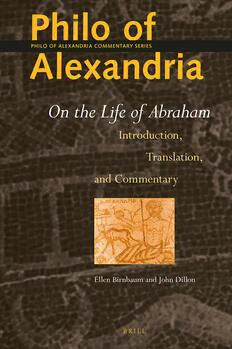Table Of ContentPhiloofAlexandriaOntheLifeofAbraham
Philo of Alexandria
Commentary Series
Generaleditor
GregoryE.Sterling
Associateeditor
DavidT.Runia
Editorialboard
HaroldW.Attridge–EllenBirnbaum
JohnDillon–AnnewiesVandenHoek–AlanMendelson
ThomasTobin,S.J.–DavidWinston
volume 6
Thetitlespublishedinthisseriesarelistedatbrill.com/pacs
Philo of Alexandria
On the Life of Abraham
Introduction,Translation,
andCommentary
By
EllenBirnbaum
JohnDillon
LEIDEN | BOSTON
LibraryofCongressCataloging-in-PublicationData
Names:Birnbaum,Ellen.|Dillon,JohnM.|Philo,ofAlexandria.DeAbrahamo.
English
Title:PhiloofAlexandria,OnthelifeofAbraham:introduction,translation,and
commentary/byEllenBirnbaum,JohnDillon.
Description:Leiden;Boston:Brill,2021.|Series:PhiloofAlexandriacommentary
series,1570-095X;volume6|Includesbibliographicalreferencesandindex.|
Summary:“OntheLifeofAbrahamdisplaysPhilo’sphilosophical,exegetical,
andliterarygeniusatitsbest.Philobeginsbyintroducingthebiblicalfigures
Enos,Enoch,Noah,Abraham,Isaac,andJacobasunwrittenlaws.Then,
interweavingliteral,ethical,andallegoricalinterpretations,Philopresentsthe
lifeandachievementsofAbraham,founderoftheJewishnation,intheformof
aGreco-Romanbios,orbiography.EllenBirnbaumandJohnDillonexplain
whyandhowthisworkisimportantwithinthecontextofPhilo’sownoeuvre,
earlyJewishandChristianexegesis,andancientphilosophy.Theyalsooffera
newEnglishtranslationanddetailedanalyses,inwhichtheyelucidatethe
meaningofPhilo’sthought,includinghisperplexingnotionthatIsrael’s
ancestorswerelawsinthemselves”–Providedbypublisher.
Identifiers:LCCN2020005056(print)|LCCN2020005057(ebook)|
ISBN9789004423633(hardback)|ISBN9789004423640(ebook)
Subjects:LCSH:Philo,ofAlexandria.|Philo,ofAlexandria.DeAbrahamo.|
Abraham(Biblicalpatriarch)|Bible.Genesis–Criticism,interpretation,etc.
Classification:LCC B689.Z7P4632021(print)|LCC B689.Z7(ebook)|
DDC222/1106–dc23
LCrecordavailableathttps://lccn.loc.gov/2020005056
LCebookrecordavailableathttps://lccn.loc.gov/2020005057
TypefacefortheLatin,Greek,andCyrillicscripts:“Brill”.Seeanddownload:brill.com/brill‑typeface.
ISSN1570-095X
ISBN978-90-04-42363-3(hardback)
ISBN978-90-04-42364-0(e-book)
Copyright2021byKoninklijkeBrillNV,Leiden,TheNetherlands.
KoninklijkeBrillNVincorporatestheimprintsBrill,BrillHes&DeGraaf,BrillNijhoff,BrillRodopi,
BrillSense,HoteiPublishing,mentisVerlag,VerlagFerdinandSchöninghandWilhelmFinkVerlag.
Allrightsreserved.Nopartofthispublicationmaybereproduced,translated,storedinaretrievalsystem,
ortransmittedinanyformorbyanymeans,electronic,mechanical,photocopying,recordingorotherwise,
withoutpriorwrittenpermissionfromthepublisher.Requestsforre-useand/ortranslationsmustbe
addressedtoKoninklijkeBrillNVviabrill.comorcopyright.com.
Thisbookisprintedonacid-freepaperandproducedinasustainablemanner.
ForDonald,
myκοινωνὸςὄντωςβίου,
“partnertothetruestextentinlife”
ToDavidWinston,
formanyhappyhoursspenttogetherincompanywithPhilo
∵
Contents
GeneralIntroductiontothePhiloofAlexandriaCommentarySeries ix
GregoryE.Sterling
Preface xvi
Abbreviations xix
Introduction 1
1 ThePlaceoftheTreatiseinPhilo’sWorks 1
2 ThePlaceoftheTreatiseinPhilo’sLife 12
3 Genre,Aims,andAudience 20
4 Structure,Content,andExegeticalApproaches 29
5 UseandInterpretationoftheBible 34
6 MajorThemes 51
7 IntellectualandCulturalInfluences 60
8 PreviousScholarship 66
9 SharedandDistinctiveFeaturesandTheirImplications 72
10 Nachleben 77
11 TheTextoftheTreatise 79
12 SomeNotesontheMethodUsedintheTranslationand
Commentary 80
Translation:PhiloofAlexandria,OntheLifeof Abraham
PartOne:Introduction,§§1–59 87
PartTwo:TheLifeofAbraham,§§60–276 101
NotestotheTextandTranslation 137
Commentary
TitleoftheWork 141
PartOne:Introduction,§§1–59 145
A Prologue,§§1–6 147
Chapter1:GenesisandtheLivingLaws,§§1–6 147
viii contents
B TheFirstTriad,§§7–47 155
Chapter2:Enos,TheManofHope,§§7–16 155
Chapter3:Enoch,TheManofRepentanceandImprovement,
§§17–26 164
Chapter4:Noah,TheManofPerfection,inHisGeneration,§§27–47 173
C TheSecondTriad 189
Chapter5:TheHigherTriadofPatriarchs,§§48–59 189
PartTwo:TheLifeofAbraham 205
A ThePietyofAbraham 207
Chapter6:TheMigrationsofAbraham,§§60–88 207
Chapter7:AbrahamandSarahinEgypt,§§89–106 231
Chapter8:TheVisitoftheThreeStrangers,§§107–132 250
Chapter9:TheDestructionoftheSodomiteCities,§§133–166 277
Chapter10:TheSacrificeofIsaac,§§167–207 302
B TheHumanityofAbraham,§§208–261 333
Chapter11:TheDisputewithLot,§§208–224 333
Chapter12:Abraham’sVictoryovertheKings,§§225–244 348
Chapter13:TheVirtuesandDeathofSarah,§§245–261 368
C Conclusion,§§262–276 394
Chapter14:AdditionalEncomiaofAbraham,Epilogue,§§262–276 394
Bibliography 411
1 PhiloofAlexandria 411
2 OtherPrimarySources 414
3 ModernScholarlyLiterature 421
IndexofBiblicalPassages 441
IndexofPhilonicPassages 447
IndexofOtherPrimarySources 461
IndexofModernScholars 471
IndexofGreekTerms 476
IndexofSubjects 478
General Introduction to the Philo of Alexandria
Commentary Series
Philo of Alexandria (c. 20BCE–c. 50CE) was a member of one of the most
prominentfamiliesof thelargeandinfluentialJewishcommunityinAlexan-
dria.WeknowmoreabouthisbrotherandhisfamilythanwedoaboutPhilo.
Hisbrother,GaiusJuliusAlexander,heldaresponsiblegovernmentalposition
(Josephus, AJ18.159,259;19.276–277;20.100)andmayhavebeenasubstantial
propertyowner(CPJ 420aand420b)aswellasthemanagerof theEgyptian
estates of Julia Augusta, the mother of the emperorTiberius (CPJ 420b). He
hadprobablybecomeknowntotheemperor’sfamilythroughHerodianinter-
mediaries(Josephus, AJ 19.276–277).Hispraenomenandnomensuggestthat
thefamilywasassociatedinsomewaywithGaiusJuliusCaesar.Itmaybethat
Caesar granted Roman citizenship to Alexander’s grandfather for assistance
duringtheAlexandrianWar(48–47BCE).Alexandermadethemostofhisposi-
tionandcontactsandbecameexceptionallywealthy(Josephus,AJ20.100).He
onceloaned200,000drachmastoAgrippaI(Josephus,AJ18.159–160).Hecov-
erednineofthetempledoorsinJerusalemwithgoldandsilver(BJ5.201–205),
anactof patronagethatattestshisimmenseresourcesaswellashiscommit-
ment to Judaism.The rabbis later report that he had aTorah scroll with the
namesofGodingoldletters(Sop.1.9andSep.Torah1.9).
Alexander’ssocialandeconomicstandingisconfirmedbytherolesof his
twosons.ThearchiveofNicanorsuggeststhatMarcusJuliusAlexander,Alexan-
der’syoungerson,wasactiveintheimport-exportbusinessthatmovedgoods
from India and Arabia through Egypt to theWest. He married Berenice, the
daughterof HerodAgrippaIandlaterpartnerof theemperorTitus,butdied
prematurelyc.43CE(Josephus,AJ19.276–277).HisolderbrotherTiberiusJulius
Alexander had one of the most remarkable careers of any provincial in the
firsttwocenturiesof theRomanEmpire.Tiberiusmovedthroughaseriesof
lower posts until he held governorships in Judea, Syria, and Egypt.When he
backedVespasianintheFlavian’sbidforthethrone,hiscareerquicklyroseto
itsapex:heservedasTitus’schiefofstaffduringtheFirstJewishRevoltin66–
70CE (Josephus, BJ 5.45–46; 6.237) and as prefect of the praetorian guard in
Romeafterthewar(CPJ418b).Whilehiscareerstrainedhisrelationshipwith
hisnativeJudaismtothebreakingpoint(Josephus,AJ20.100;Philo,Prov.and
Anim.),itatteststhehighstandingofthefamily.
Themostfamousmemberofthisremarkablefamilywasparadoxicallyprob-
ablytheleastknowninwidercirclesduringhislife.Thisisundoubtedlydueto
x general introduction
thecontemplativenatureofthelifethathechose.Hischoicewasnottotal.He
mayhavehadsomecivicfunctionintheJewishcommunity.Atleastthiswould
helptoexplainwhytheAlexandrianJewishcommunityselectedhimtoserve
onthefirstJewishdelegationtoRomeafterthepogrominAlexandriain38CE,
adelegationthatprobablyincludedhisbrotherandoldernephew(Legat.182,
370; Anim. 54).The political arena was not, however,where his heart lay; he
gavehishearttothelifeoftheintellect(Spec.3.1–6).Heundoubtedlyreceived
afulleducationthatincludedtraininginthegymnasium,theephebate,and
advancedlecturesinphilosophyandrhetoric.Hisphilosophicaltrainingwasof
enormousimportancetohisintellectualformation.Whileheknewandmade
useofdifferentphilosophicaltraditionssuchasStoicismandPythagoreanism,
hisbasicorientationwasPlatonic.MiddlePlatonism(c.80BCE–c.220CE)had
becomeavibrantintellectualmovementinAlexandriainthefirstcenturyBCE,
especially in the work of Eudorus (fl. 25BCE). Philo became convinced that
PlatoandMosesunderstoodrealityinsimilarways,althoughhewasunequiv-
ocalaboutwhosawitmostclearly.HiscommitmenttoJudaismisevidentin
histrainingintheLXX:heknewitwiththeintimacyofonewholivedwithit
fromthecradle.Healsoknewtheworksof someof hisJewishliteraryprede-
cessorssuchasAristobulus,Pseudo-Aristeas,andEzekielthetragedian.Hewas
awareofasignificantnumberofotherJewishexegetestowhomhealludedin
hiscommentaries,butalwaysanonymously(Opif.26,77,andMigr.89–93).The
mostprobablesocialsettingforhisliteraryworkisaprivateschoolinwhichhe
offeredinstructioninmuchthesamewaythatphilosophersandphysiciansdid.
Thiswaslikelyinhisownprivateresidence,butasettinginahouseofprayer
(synagogue)cannotberuledout.
Oneofthewaysthathetaughtwasthroughwriting.Histreatisesconstitute
oneofthelargestGreekcorporathathascomedowntousfromantiquity.We
knowthathewrotemorethanseventytreatises:thirty-sevenof thesesurvive
inGreekmanuscriptsandnine(ascountedinthetradition)inaratherliteral
sixth-centuryArmeniantranslation.Wealsohaveexcerptsofanotherworkin
Greekandfragmentsof twomoreinArmenian.Thelosttreatisesareknown
fromreferencestothemintheextanttreatises,gapsinhisanalysesofthebib-
licaltextsinthecommentaryseries,andtestimonia.
Thetreatisesfallintofivemajorgroups:threeseparatecommentaryseries,
thephilosophicalwritings,andtheapologeticwritings.Thethreecommentary
seriesarePhilo’sownliterarycreations;thephilosophicalandapologeticseries
aremodernconstructsthatgroupconceptuallysimilarbutliterarilyindepen-
denttreatises.
The heart of the Philonic enterprise lay in the three commentary series.
Each of these was an independent work with a distinct rationale and form.

